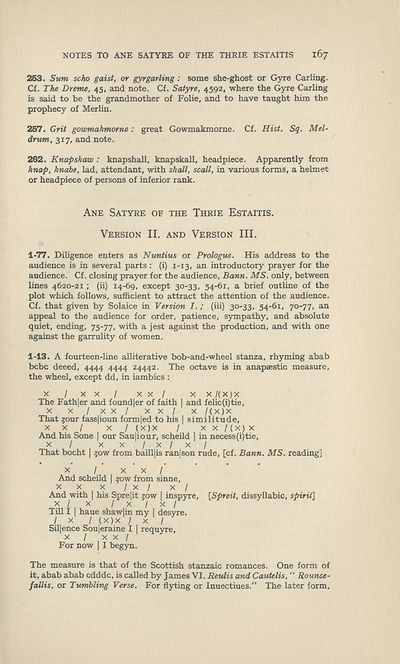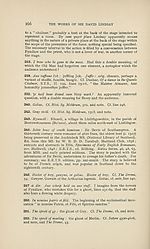Scottish Text Society publications > Third series > Works of Sir David Lindsay of the Mount, 1490-1555 > Volume 4, 1936
(235)
Download files
Complete book:
Individual page:
Thumbnail gallery: Grid view | List view

NOTES TO ANE SATYRE OF THE THRIE ESTAITIS 167
253. Sum scho gaist, or gyrgarling : some she-ghost or Gyre Carling.
Cf. The Dreme, 45, and note. Cf. Satyre, 4592, where the Gyre Carling
is said to be the grandmother of Folie, and to have taught him the
prophecy of Merlin.
257. Grit gowmakmorne : great Gowmakmorne. Cf. Hist. Sq. Mel-
drum, 317, and note.
262. Knapskaw : knapshall, knapskall, headpiece. Apparently from
knap, knabe, lad, attendant, with shall, scall, in various forms, a helmet
or headpiece of persons of inferior rank.
Ane Satyre of the Thrie Estaitis.
Version II. and Version III.
1-77. Diligence enters as Nuntius or Prologue. His address to the
audience is in several parts: (i) 1-13, an introductory prayer for the
audience. Cf. closing prayer for the audience, Bann. MS. only, between
lines 4620-21 ; (ii) 14-69, except 30-33, 54-61, a brief outline of the
plot which follows, sufficient to attract the attention of the audience.
Cf. that given by Solaice in Version I. ; (iii) 30-33, 54-61, 70-77, an
appeal to the audience for order, patience, sympathy, and absolute
quiet, ending, 75-77, with a jest against the production, and with one
against the garrulity of women.
1-13. A fourteen-line alliterative bob-and-wheel stanza, rhyming abab
bcbc deeed, 4444 4444 24442. The octave is in anapaestic measure,
the wheel, except dd, in iambics :
x / xx / xx/ xx/(x)x
The Fath|er and found|er of faith | and felic(i)tie,
x x /xx/ xx/ x/(x)x
That ^our fassjioun formjed to his | similitude,
x x / x / (x)x / xx/(x)x
And his Sone | our Sau|iour, scheild | in necess(i)tie,
x / xx I x I x I
That bocht | 50W from bailljis ran|son rude, [cf. Bann. MS. reading]
x / xx/
And scheild | ?ow from sinne,
xx x / x / x /
And with | his Spre|it |ow | inspyre, [Spreit, dissyllabic, spirit]
X / X 1 X I X I
Till I | haue shaw|in my I desyre.
/ x / (x) x / x /
Sil|ence Sou|eraine I | requyre,
x / xx/
For now | I begyn.
The measure is that of the Scottish stanzaic romances. One form of
it, abab abab cdddc, is called by James VI. Reulis and Cautelis, “ Rounce-
fallis, or Tumbling Verse. For flyting or Inuectiues." The later form.
253. Sum scho gaist, or gyrgarling : some she-ghost or Gyre Carling.
Cf. The Dreme, 45, and note. Cf. Satyre, 4592, where the Gyre Carling
is said to be the grandmother of Folie, and to have taught him the
prophecy of Merlin.
257. Grit gowmakmorne : great Gowmakmorne. Cf. Hist. Sq. Mel-
drum, 317, and note.
262. Knapskaw : knapshall, knapskall, headpiece. Apparently from
knap, knabe, lad, attendant, with shall, scall, in various forms, a helmet
or headpiece of persons of inferior rank.
Ane Satyre of the Thrie Estaitis.
Version II. and Version III.
1-77. Diligence enters as Nuntius or Prologue. His address to the
audience is in several parts: (i) 1-13, an introductory prayer for the
audience. Cf. closing prayer for the audience, Bann. MS. only, between
lines 4620-21 ; (ii) 14-69, except 30-33, 54-61, a brief outline of the
plot which follows, sufficient to attract the attention of the audience.
Cf. that given by Solaice in Version I. ; (iii) 30-33, 54-61, 70-77, an
appeal to the audience for order, patience, sympathy, and absolute
quiet, ending, 75-77, with a jest against the production, and with one
against the garrulity of women.
1-13. A fourteen-line alliterative bob-and-wheel stanza, rhyming abab
bcbc deeed, 4444 4444 24442. The octave is in anapaestic measure,
the wheel, except dd, in iambics :
x / xx / xx/ xx/(x)x
The Fath|er and found|er of faith | and felic(i)tie,
x x /xx/ xx/ x/(x)x
That ^our fassjioun formjed to his | similitude,
x x / x / (x)x / xx/(x)x
And his Sone | our Sau|iour, scheild | in necess(i)tie,
x / xx I x I x I
That bocht | 50W from bailljis ran|son rude, [cf. Bann. MS. reading]
x / xx/
And scheild | ?ow from sinne,
xx x / x / x /
And with | his Spre|it |ow | inspyre, [Spreit, dissyllabic, spirit]
X / X 1 X I X I
Till I | haue shaw|in my I desyre.
/ x / (x) x / x /
Sil|ence Sou|eraine I | requyre,
x / xx/
For now | I begyn.
The measure is that of the Scottish stanzaic romances. One form of
it, abab abab cdddc, is called by James VI. Reulis and Cautelis, “ Rounce-
fallis, or Tumbling Verse. For flyting or Inuectiues." The later form.
Set display mode to: Large image | Zoom image | Transcription
Images and transcriptions on this page, including medium image downloads, may be used under the Creative Commons Attribution 4.0 International Licence unless otherwise stated. ![]()
| Publications by Scottish clubs > Scottish Text Society publications > Third series > Works of Sir David Lindsay of the Mount, 1490-1555 > Volume 4, 1936 > (235) |
|---|
| Permanent URL | https://digital.nls.uk/107277695 |
|---|
| Shelfmark | SCS.STES3.8 |
|---|---|
| Attribution and copyright: |
|
| Description | A collection of over 100 Scottish texts dating from around 1400 to 1700. Most titles are in Scots, and include editions of poetry, drama, and prose by major Scottish writers such as John Barbour, William Dunbar, Gavin Douglas, and George Buchanan. Edited by a key scholarly publisher of Scotland's literary history, and published from the late 19th century onwards by the Scottish Text Society. Available here are STS series 1-3. |
|---|

